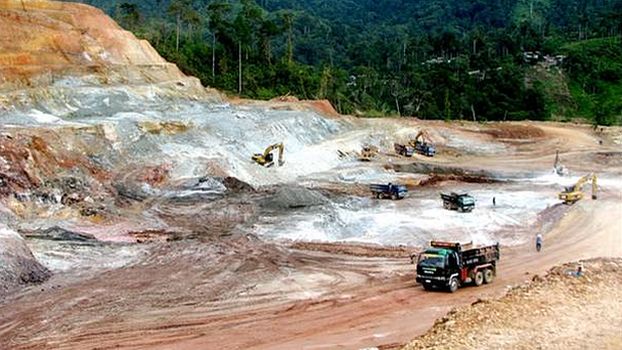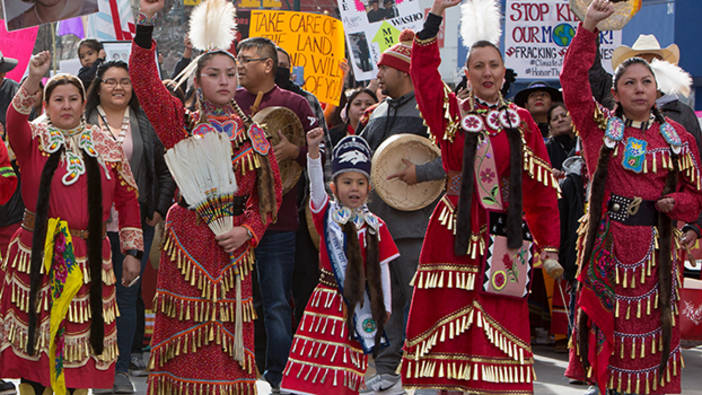
Amidst global inequality and the alarming progression of climate breakdown, calls to restructure the global economy in a way that responds to the climate crisis have grown stentorian. Foremost in the discourse is the Green New Deal (GND)—an umbrella term for policy packages that promise to galvanize “large-scale, equality-oriented systemic transformation of Global North economies”.
Alanah Torralba is a climate journalist from the Philippines, and previously worked as programme manager at the Rosa-Luxemburg-Stiftung’s Manila Office. She is currently a political science graduate student in Barcelona, Spain, where she studies the nexus of youth political participation and climate justice.
In the imaginations of policymakers, the Green New Deal can successfully address climate change, perpetuate economic growth, and satisfy public demands for climate justice by aggressively pushing for carbon neutrality through the lens of a “just transition”. While these policy proposals might offer a divergent approach to conventional climate policymaking, there remains a blind spot in the appraisal of the human costs to the Global South of such a gargantuan undertaking.
The production processes, for instance, implied in the shift to renewable energy and sectoral transitions will require massive mining projects in countries in the Global South such as the Philippines. These will have unimaginable consequences for frontline communities already besieged by multiple crises and injustices that are yet to be addressed in Green New Deal proposals.
In particular, this article aims to highlight the response of civil society leaders in the Philippines to the dominant Green New Deal proposals in the US (House Resolution 2019 introduced by Rep. Alexandria Ocasio-Cortez) and Europe (European Green Deal). Through the perspective of the Philippines, a country rich in metals such as copper and nickel, this article seeks to voice concerns about a nascent climate policy framework grounded in the Global North. It also aims to collate recommendations for the Green New Deal, in an effort to shape it to serve the broader goal of climate justice.
What is the Green New Deal?
Between 1933 and 1939, US President Franklin Delano Roosevelt rolled out public infrastructure projects and financial reforms geared toward revitalizing the economy and generating federally-guaranteed jobs after the Great Depression. He termed this the “New Deal” to signal a digression from a previously “laissez-faire” American attitude to the economy to a more welcoming stance on government regulation of the private sector.
The Green New Deal takes after the political spirit of the New Deal. In centring equity and social inclusion in green stimulus packages, the Green New Deal incorporates a reformist and “green” purview of capitalist economies.
Green Neo-Colonialism
News of growing demand for rare earth minerals is posing fresh anxieties to mining communities in the Philippines, a country that holds the fourth-largest global reserves of the vital industrial mineral, copper.
The recent rollout of various green stimulus packages from China and the US suggests that the popularity of the Green New Deal has had a rallying effect on the market price of copper, which spiked for the first time since 2018 to 7,000 US dollars per tonne.
Lia Alonzo, executive director of the Center for Environmental Concerns – Philippines (CEC), an organization working with mining communities and environmental defenders, offered this insight:
When global demand rises, it is met with policies that accommodate more foreign investments. [Because] The mining industry of the Philippines does not serve its own needs and economy … With more mining concessions come increased human rights abuses. This is our fear [with the Green New Deal] because the Mining Act of the Philippines does not currently have strong safeguards against human rights violations.
In a country whose government is subservient to the interests of foreign capital, the Green New Deal could prove catastrophic to frontline communities as well as derail ongoing struggles for national sovereignty. When extracted minerals are shipped back to industrialized countries as “raw materials” to be processed into more valuable “final products” that are then sold back to the source countries, the trade-off amplifies an inherent power imbalance between industrialized and developing nations.
It is what the Ghanaian revolutionary leader Kwame Nkrumah termed “neo-colonialism”, a political system where former colonizers—through private corporations, free trade agreements, and conditional aid—exploit the resources of a former colony to maintain an invisible stranglehold on its economy, thereby arresting its development and process of decolonization.
In the Green New Deal era, neo-colonialism subsumes the sheen of the “green” narrative, as transnational corporations and governments invoke the onus of rapid decarbonization as an excuse for unabated mining. The danger of green neo-colonialism lies in the deceptive positioning of mining and fossil fuel companies as champions of the climate emergency despite their hand in the pillaging of resources in the developing world, which further intensifies the climate crisis.
Upholding the Right to National Industrialization
Because mining is designed principally for exports in its primary form, its benefits are hardly felt by the source country—both for the immediate community around the mining sites and for the national economy. However, when directed toward national industrialization, mining can play an important role in the economies of developing nations such as the Philippines.
Alonzo gives some more context:
Generally, grassroots communities are against mining but they also understand that it is necessary to industrialize. That’s what needs to change in the Philippines. We need to shift the framing from export-oriented [trade] to national industrialization.
In anticipation of the hyper-demand for minerals in the wake of a global green transition, it is important to stress that developing nations such as the Philippines should be able to assert their sovereignty on attendant matters such as national patrimony. It is therefore crucial to ensure that there is fair trade among nations, according to Alonzo. For instance, current prices of rare earth minerals do not reflect the real harm of destructive mining practices that leave irreversible damage to marginalized groups in the form of severe environmental degradation and the resulting broken social bonds. Ensuring that communities are able to assert autonomy in rejecting a mining company’s incursion into their territory needs to be enshrined in any Green New Deal proposal. Communities must also have “the right to say no”. While the need to decarbonize the planet has never been more urgent, it should not happen through, in Nkrumah’s words, the “enrichment of one side of the world out of the exploitation of the other”.
Thus, developing countries should also be afforded the space to industrialize in the climate emergency era. Certainly, this should not be done by burning fossil fuels or the wholesale exploitation of natural resources, but by rechannelling fossil fuel subsidies and conditional aid as a form of climate reparations.
Closing the Loopholes of Decarbonization
In the view of Francis Joseph Dela Cruz, advisor for the Institute for Climate and Sustainable Cities and a climate activist for 20 years, ensuring that the loopholes of decarbonization are closed is essential if the Green New Deal is to truly deliver on its promises of carbon neutrality. This must mean decoupling energy consumption from fossil fuels.
According to Dela Cruz, the “Green New Deal is an invitation that many advocates in the Philippines can entertain but we need to be careful that the solutions that are being offered are not just ‘green’ but transformative”. He goes on to give the example of how electric vehicles are being marketed as a climate solution. Yet, if the batteries of an electric vehicle are charged to the main grid, which is primarily powered by coal, the effect on emissions reductions will be negligible.
However, it must be noted that merely decoupling economic activities from fossil fuels is not enough, indeed it is downright improbable. Global North countries must also reorganize their economies in a way that provides decent living standards to their citizens through minimal energy production and consumption, as a growing body of research has shown that unrestricted economic growth is simply incompatible with planetary boundaries.
Scrutinizing “Net Zero”
Similarly, “net zero” proclamations from governments and corporations must be held to account. As more voices in the scientific community debunk the misleading promises of net zero targets and carbon offsetting, it is becoming more apparent that the consequences of circumventing emissions reductions goals—by passing the burden onto highly vulnerable countries like the Philippines—will be deadly.
“Net zero” targets by governments and corporations cannot be assumed to signal genuine climate action, as these tend to obfuscate that most net zero projects do not cut emissions in the present but instead rely on unproven future technologies such as direct air capture (DAC) or bioenergy with carbon capture and storage (BECCS) to remove carbon dioxide from the atmosphere. Additionally, net zero targets are complicit in the delay of fossil fuel phaseout by setting distant goals—such as “Net-Zero 2050” in the European Green Deal and US Green New Deal. The danger of hinging climate protection on geoengineering fantasies cannot be underscored enough.
Net zero plans also depend on large-scale afforestation projects in the Global South, which could compound existing environmental injustices and add pressure to what are already precarious ecosystems. Large-scale afforestation projects, which tend to employ uniform, short-rotation plantations or monoculture species, have also been found to be less effective at carbon storage in the long run. “Nature-based” solutions such as massive tree plantation projects and technological solutions for carbon dioxide removal are expensive, energy-intensive, and ultimately speculative in terms of real emissions reductions in the present.
Instead, Global North countries would do well to direct resources to protect biodiverse and natural ecosystems such as old-growth forests, which have been proven to be more stable in storing carbon than massive afforestation projects, especially during drought. Research has also confirmed that empowering indigenous peoples and local communities as stewards of their land by securing their human rights and autonomy is the most efficient way to protect ecosystems.
Moreover, it is paramount that rigid accounting mechanisms be installed in industrial emissions targets to ensure the Green New Deal’s integrity. Only when industrial emissions targets are sufficiently lowered will we see the genuine contribution of carbon sequestration from natural ecosystems to climate mitigation. Real action, in terms of focusing on safeguarding natural ecosystems and rejecting geoengineering solutions, will signify a genuine commitment to climate mitigation in the Green New Deal.
Guaranteeing a “Just Transition” and Rejecting Technology Worship
According to Neth Dano, a researcher at the technology-focused ETC Group and a veteran Filipino climate justice advocate, while civil society groups may welcome the Green New Deal generally, the details of the policy framework raise alarm bells because of its seeming “worship of technology”.
“We welcome it in broad strokes … but we need to be careful of framing climate change as a technology problem. The Green New Deal [especially the one proposed in the US] is so dependent on technology”, she said. Green New Deal proposals, such as the H.R. Resolution 2019 in the US and the European Green Deal, highlight the need for the integration of “smart” technologies in regulating energy efficiency in homes as well as the organization of power distribution.
In the case of digitalization of energy, Dano cites the potential to cause unjust energy distribution through the use of blockchain technology that supposedly uses a neutral algorithm. She points out that the decisions on algorithms are still taken by humans with their own biases and that a “digital ledger that allows seamless transaction without the idea of a [human] intermediary is cause for concern”. Thus, the overarching theme of technological primacy in the Green New Deal assumes that technology is a neutral tool that is available to everyone. This is a dangerous position to adopt because it ignores basic questions of ownership and control, especially for developing nations. Hence, treating scientific knowledge production as a public good and giving equal access to developing innovations to all is pertinent in codifying equity into the Green New Deal.
Towards a Global Green New Deal: Resisting Cost-Shifting
While centring “just transition” in the Green New Deal is a positive development in the realm of climate policymaking, ignoring the additional strain that this new project will impose on developing nations displays a typical deficiency of climate policies originated by the Global North. To ensure that the Green New Deal delivers on its goals of climate protection and social justice, the welfare of the entire planet must be embedded in its ethos.
Thus, I suggest the inclusion of the following points in Green New Deal proposals:
- Provide concrete safeguards against human rights violations in trade exchanges involving rare earth minerals, and enshrine the right of communities to self-determination;
- Ensure the fair pricing of vital industrial metals to show the true human and environmental costs of mining;
- Open up access to technological innovation to the Global South, and provide more funding for climate science, while also integrating indigenous knowledge and practices into climate science;
- Rechannel fossil fuel subsidies to developing nations as a form of climate reparations;
- Streamline accounting mechanisms in climate pledges, and audit net-zero programmes;
- Disentangle climate pledges from a technology-centred approach, and instead focus on decreasing consumption behaviours of Global North and other industrialized countries as part of a comprehensive fossil fuel phaseout plan.
Answering the question of who bears the environmental, social, and economic impacts of supplying the materials needed to build the foundation of the Global North’s “green new world” is a crucial step in reckoning with the oppressive system that has borne the climate crisis in the first place.
Leaders and policymakers need to uphold the Global South’s welfare in the minutiae of the Green New Deal. While we agree on the urgent need to decarbonize the global economy, we cannot allow for a repeat of neo-colonialism that is merely cloaked in lofty “green” rhetoric. For the Green New Deal to be truly transformative and radical, we need a rigorous reckoning of the West’s historical responsibility for climate change, as well as its responsibility for the welfare of the planet.
This starts with a resolute rejection of attempts to shift the burden of potential future harms caused by the Green New Deal to developing nations such as the Philippines.

